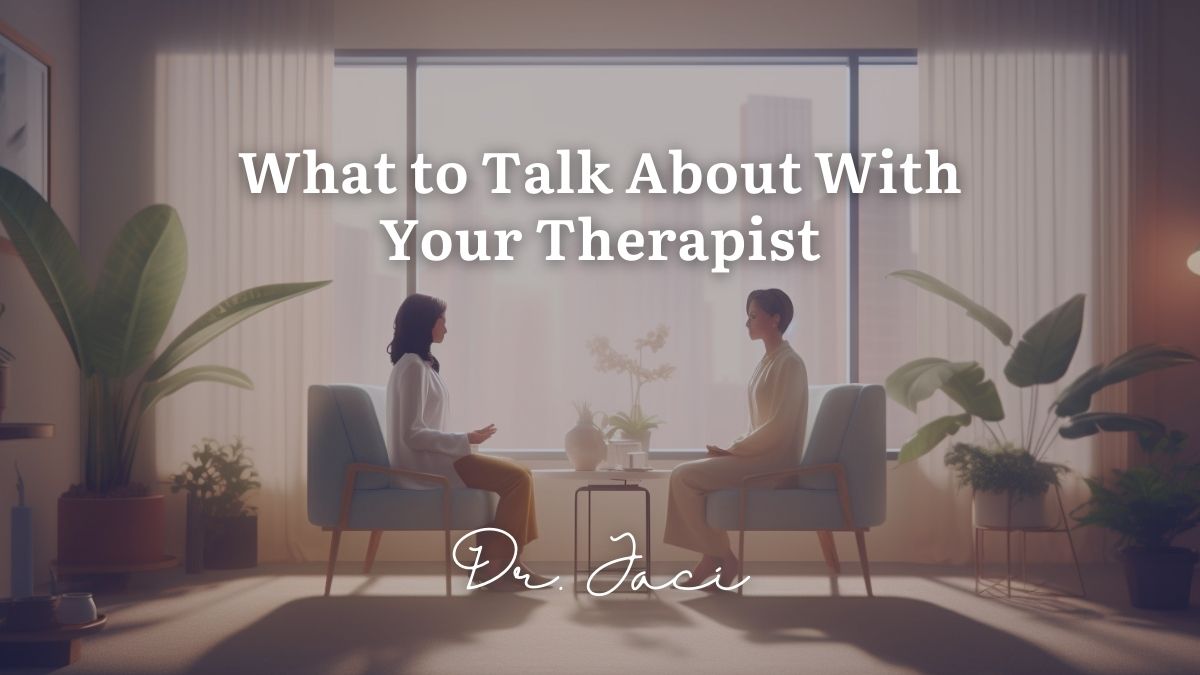One of the toughest questions for those new to therapy is what to talk about with your therapist.
There is no right answer to this question, but sometimes it can be helpful to see some potential ideas.
In this post, I will share why it’s important to focus on the right things in therapy, provide some ideas about what to talk about, and share tips for effective communication with your therapist.
Why Is It Important to Talk About the Right Things in Therapy?
Talking about the right things in therapy is crucial to achieving your mental health goals.
Therapy can help you gain insights into your thoughts, emotions, and behaviors and develop coping mechanisms to deal with challenges.
But, to get there, you need to talk about the things that matter to you.
If you hold back or don’t know what to say, it can limit the effectiveness of therapy.
Related: Top 5 Benefits of Individual Therapy: A Therapist’s Perspective
How to Prepare for Therapy Sessions?
Before you start therapy, it’s essential to set some goals and expectations for yourself.
Think about what you hope to achieve from therapy and discuss it with your therapist.
It’s also helpful to keep a journal or notes on your thoughts and emotions to refer to during your sessions.
Additionally, if you’re feeling anxious or nervous, it can be helpful to jot down some talking points beforehand to help you get started.
Key Topics to Discuss With Your Therapist

As a therapist, I encourage my clients to be open about a range of issues. The therapy room is a safe and non-judgmental space where you can discuss anything that’s important to you or causing distress.
Here’s a deeper look into some crucial topics:
Your Emotions
Emotions are at the heart of many mental health issues and a primary focus in therapy.
I encourage clients to explore their feelings deeply, understand what triggers these emotions, and identify healthy ways of expressing and managing them.
It’s also valuable to explore whether your emotions are proportionate to their triggers and to learn techniques for emotional regulation.
Related: Why Do I Cry When I Talk About My Feelings?
Your Relationships
Our relationships significantly impact our mental and emotional health.
By discussing relationships with a therapist, you can understand the patterns that you fall into, learn better communication skills, and manage conflicts more effectively.
This exploration can lead to more fulfilling relationships that support your emotional well-being.
Your Thoughts and Beliefs
Our thoughts and beliefs often drive our actions and emotional responses.
Cognitive-Behavioral Therapy (CBT) revolves around understanding these thinking patterns and challenging irrational or negative beliefs.
A therapist can help you identify and change unhelpful thought patterns that may be contributing to mental health issues.
Life Transitions
Life is full of changes, and even positive changes can cause stress.
I often work with clients who are experiencing significant life transitions, such as starting a new job, getting married or divorced, or becoming a parent.
Therapy can provide tools to manage the stress associated with these changes, develop adaptive strategies, and process related emotions.
Trauma and PTSD
Therapy can be very beneficial for individuals who have experienced trauma.
Trauma-focused therapies, such as EMDR and Trauma-Focused CBT, are designed to help you process traumatic events, reduce distressing symptoms, and develop healthier coping mechanisms.
Anxiety and Depression
These are two of the most common mental health conditions, and discussing them openly with a therapist is vital.
In therapy, we can explore the root causes of your anxiety and depression, identify triggers, and develop practical strategies to manage your symptoms.
Self-Esteem and Confidence
Low self-esteem and lack of confidence can negatively affect all areas of life.
Therapy can help you explore the roots of these feelings, challenge negative self-perceptions, and build self-compassion and self-confidence.
Substance Abuse
If you’re struggling with addiction, therapy can provide vital support.
Together, with a therapist, you can identify the underlying issues driving your substance use, develop strategies for recovery, and build a strong support system to maintain sobriety.
Work and Career
Workplace stress is a significant concern for many people. In therapy, we can explore your work environment, identify stressors, and develop coping mechanisms.
Career counseling can also help you align your job with your personal goals and values.
Body Image
If you struggle with body image issues, it’s essential to address them in therapy.
You can work with a therapist to challenge negative self-perceptions, develop a healthier body image, and build self-compassion and acceptance.
Each therapy journey is unique, and it’s essential to remember that your concerns and experiences are valid, no matter what they are.
A therapist’s role is to guide you, support you, and provide you with tools and strategies that can help you navigate your mental health journey.
Tips for Effective Communication with Your Therapist

Building a trusting and effective relationship with your therapist is a key part of the therapeutic process.
Below are some tips to ensure effective communication with your therapist.
| Technique | Why It’s Important | Tips for Implementation |
| Prioritize Honesty | Creates a foundation for effective therapy | Be truthful about thoughts, feelings, and experiences |
| Express Yourself Freely | Provides valuable information about your emotional state | Don’t hold back emotions, let them out |
| Provide Specific Details | Helps the therapist address your issues more effectively | Avoid being vague, give more context and details |
| Use “I” Statements | Encourages ownership of emotions, avoids blame | Replace “you make me feel…” with “I feel… when…” |
| Practice Active Listening | Ensures understanding and builds rapport | Pay attention to what the therapist is saying and respond thoughtfully |
Prioritize Honesty and Openness
Effective therapy is built on a foundation of honesty and openness.
It’s critical that you share your thoughts, feelings, and experiences as truthfully as you can with your therapist.
This may occasionally feel uncomfortable or leave you feeling vulnerable, but remember that your therapist is there to support and guide you, not to judge you.
The more authentic you are, the better your therapist can understand you and help.
Express Yourself Freely
In therapy, your emotions are important data. Don’t hold back your feelings.
Therapy is intended to be a safe space where you can express your emotions freely without fear of judgment or reprisal.
Bottling up your feelings can delay your progress, so let them out.
Provide Specific Details
Try to be as specific as possible when discussing your thoughts, feelings, and experiences.
Vague or general statements can be difficult for your therapist to address effectively.
Remember, the more details you provide, the better your therapist can tailor their guidance to your unique situation.
Use “I” Statements
When communicating your thoughts and feelings, try to use “I” statements rather than “you” statements.
For instance, instead of saying “you make me feel…” say “I feel… when…”.
This approach encourages ownership of your emotions and helps avoid the tendency to place blame on others.
Practice Active Listening
Active listening involves not only hearing what your therapist is saying but also truly understanding and responding to it thoughtfully.
This can help to build a solid rapport between you and your therapist and can also provide you with valuable insights.
Feel Free to Take Breaks
Therapy can sometimes be intense, and it’s completely acceptable to ask for a pause if you’re feeling overwhelmed during a session.
A brief break can help you regain your composure, collect your thoughts, and continue the session more effectively.
Embrace Patience
It’s important to understand that therapy is a process that takes time. It’s unlikely to see instant results after just a few sessions.
So, be patient with yourself and the process, trust in the progress you’re making, even if it’s not immediately visible, and remember that it’s okay to move at your own pace toward your mental health goals.
These are guidelines, not rules, and every therapeutic relationship is unique.
The most important thing is that you feel comfortable and safe.
Speak up if something doesn’t feel right, and work with your therapist to ensure that your therapy is as effective as it can be.
Conclusion
Effective communication is crucial to getting the most out of your therapy sessions.
By discussing the right topics with your therapist and practicing good communication skills, you can gain insights into your thoughts, emotions, and behaviors and develop coping mechanisms to deal with challenges.
Remember to be honest, open, and specific, and take an active role in your therapy sessions.
With these tips and guidance, you can make the most out of your therapy experience and improve your mental health and emotional well-being.
FAQs
Can I bring up any topic in therapy?
Yes, therapy is a safe space to discuss any topic that’s on your mind.
How often should I see my therapist?
The frequency of therapy sessions depends on your individual needs and goals. Your therapist can help you determine the appropriate frequency of sessions.
What if I don’t feel comfortable discussing a certain topic with my therapist?
It’s okay to feel uncomfortable or vulnerable in therapy.
Talk to your therapist about your concerns and work together to find a way to address the topic in a way that feels safe and comfortable for you.
What if I don’t see progress in therapy?
Therapy is a process, and progress may take time.
Talk to your therapist about your concerns and work together to adjust your approach and goals.
How do I know if therapy is right for me?
Therapy can be beneficial for anyone who wants to improve their mental health and emotional well-being.
Talk with your primary care physician, psychiatrist, or any mental health professional about your concerns and explore your options to see if therapy is right for you.

